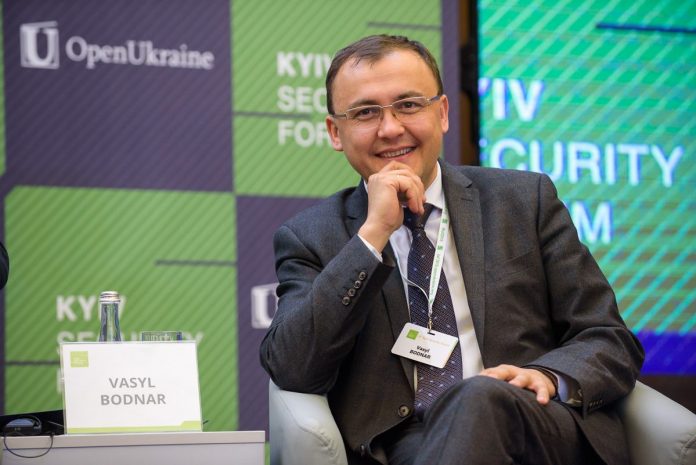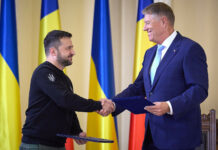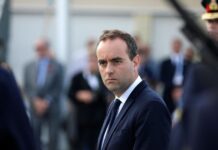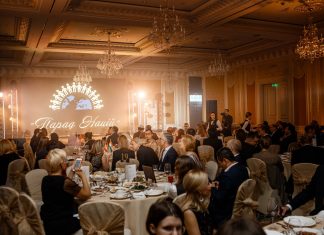The exacerbation of the military conflict in the Donbas, misunderstandings with its western neighbours, the construction of the North Stream and the Kerch Bridge – these are the challenges faced by our state. Could we stand these challenges? Deputy of the Minister of Foreign Affairs of Ukraine Vasyl Bodnar in an exclusive interview has revealed for the FD some secrets of Ukraine’s informational and diplomatic confrontation with its enemies.
The President of Ukraine has been repeatedly defining the foreign policy during the war time as the “second front”. Do you agree with this statement?
– Of course, I agree. First of all, we must pay tribute to those guys who are at the front. There is the first line of defense there. We, like many other citizens of Ukraine, do our best to make their fight easier for them. Simply saying, our second diplomatic front helps the first front, the military one. Many eff orts are being made to ensure that our international partners understand the real situation in the east of our country – not pro-Russian media massages.
The vertical of power that includes the Presidential Administration of Ukraine, the Ministry of Foreign Affairs and the Ministry of Defense has been working effectively and coherently. We clearly understand our goals, we have tasks and we know the way to cope with them.

What can you define as the greatest achievement of the Ukrainian diplomacy during the recent years?
– First of all, it comes about the preservation of international solidarity with Ukraine. If we recall Russia’s aggression against Georgia in 2008, then the West, in fact, would not notice it. The fact is that the issue of the Ukrainian-Russian war in the Donbas and the Crimean occupation continues to be in the focus of the international community and is an unquestionable achievement of our foreign policy service. We do not let the world relax, because we constantly point out how cruel the Russian aggression is against us. In fact, thanks to the eff orts of the Ministry of Foreign Affairs, the world began to look at modern Ukraine in a different way, and on the other hand, it has been constantly understanding the aggressive nature of Russia. Today’s geopolitical changes in the global scale are taking place due to our eff orts as well. Let us be frank – I do not want to exaggerate the role of the Ministry of Foreign Affairs of Ukraine excessively, but the constant emphasis on the need to adhere to the norms of international law, the constant emphasis on the fact that we will not surrender, also belong to the successes of the Ukrainian diplomatic department.
You had visited Transcarpathia in February this year and had meetings with the representatives of the local Hungarian community. Why did you, as a representative of the foreign policy department, meet with Ukrainian citizens? Is the situation in Transcarpathia so complicated?
– The situation in Transcarpathia is mostly stable and normal. The representatives of the Hungarian community exist under the conditions that were created for them during the years of independence. They live in harmony – both with local authorities, with the Ukrainian majority, and with other minorities of Transcarpathia. There are no such acute problems as some media say here in Kyiv about. There is neither separatism nor attempts to split Ukraine.
At the same time, there are attempts to disassociate the situation from the outside and provocations have become more frequent. As for the linguistic issue, systemic changes in education have been taking place in Ukraine and therefore the question arises – why the system of education for Transcarpathian Hungarians is transformed? But the rules are changed not only for the Hungarians, but also for the Poles, the Romanians and for the representatives of other national minorities. These changes are aimed at the approval of the state Ukrainian language and to the preservation of national languages either. At the time when I was visiting Transcarpathia, there was the OSCE High Commissioner for National Minorities and I had a meeting with him.
In addition, the consultations with the Hungarian community were planned in Uzhgorod. Also, taking advantage of the opportunity, I met the People’s Deputy of Ukraine Mr. V. Brenzovych, the head of the Hungarian Society who during our meeting did not put forward any political demands.
The Transcarpathian Hungarians have a different requirement – they would like to have school textbooks and educational programs in Hungarian, they have fears that they will be deprived of their ability to study in their native language. These fears must be refuted. Therefore, it is very good that the Ministry of Foreign Affairs communicates and meets with citizens of Ukraine that have certain special views. Such meetings help to form a position in the negotiations with the Hungarians. As you know, during the June meeting of the Minister of Education and Science of Ukraine Liliya Hrynevych and the representatives of the Hungarian community, the first ladies of Ukraine and Hungary met, there were fruitful negotiations between the four ministers (foreign affairs and education from both sides). We are going through a good negotiation and surely we will gradually come up with a solution that will satisfy both parties and remove the tension that was created around the law on education.

The tension in the relations between Kyiv and Warsaw has been subsided. If this is not a state secret, then tell us how our diplomats have succeeded in that?
– We must always be ready for the calm negotiating with the Polish side. Meaning the problems that concerned historical memory, I would like to believe that the peak of tension has already passed. At least, now, we can see the constructive approach from the Polish side – so, we are taking counter-steps from ours. In early June 2018, a conversation was held between Vice Prime Ministers P. Rozenko and P. Glynsky that discussed urgent issues of practical interstate cooperation. Also, at the moment we have been working to enable the invitation of the delegation of Polish experts to Ukraine to discuss the restoration of our monuments in Poland and the exhumation of the remains of people buried in Ukraine. We must defend our own position, while not politicizing the issue of historical memory. Consequently, the positive side in our relations with Poland in recent months has increased significantly.
Do you believe that the conflict in the Donbas can be resolved exclusively by political tools? What is your confidence based on?
– If you do not have a strong army, then no diplomacy will help. Just remind of the Budapest memorandum story. On the other hand, we have no right to spend thousands of lives of our citizens. Political methods should play a leading role. The Donbas problem is needed to be resolved through the implementation of an international peacekeeping mission. The Minsk agreements, as we all have the opportunity to observe, do not work because of Russia’s reluctance to abandon its aggressive policy. We see the Kremlin’s targeted policy of preserving of the controlled burning phase of the conflict.
Moscow does not want a reconcilement. After all, if the issue is resolved in the Donbas, then the question of the Crimea, the resolution of conflicts on Russian participation in South Ossetia, Abkhazia and Transnistria will inevitably arise. Russia is not in a need of this.
Do you think that Russia could be convinced in the need of the peacekeeping mission in Donbas?
– We have to do it. At least, we have an understanding of our international partners about this conviction. This is expressed, first of all, in the steady preservation of sanctions against Russia. Even in spite of some contradictions between the G7 countries, they all demonstrate their support for Ukraine and not least in the sanction issue.
The construction of the Kerch Bridge and the Northern Gas Pipeline by the Russian Federation is detrimental for our national interests. Which measures are being proposed by the Foreign Ministry of Ukraine? Can we count on US assistance in these issues?
– We already have this assistance. The United States actively supports not only Ukraine but also other countries that counteract the construction of the North Stream. Of course, this cannot but cause certain turbulence in Europe. As for us both the North Stream and the Kerch Bridge are elements of the continuation of aggression against us. Therefore, Ukraine has already fi led claims for violation of maritime law. Both legal mechanisms and a political dialogue are applied.
We will not fold our hands.
Do you believe in the victory of Ukraine?
– Of course. First of all, we proved the possibility of resistance. In 2013, it would be unlikely that someone had believed that we would have been able to resist such powerful aggression. But since 2014, we have opposed to the military, information, financial power of the Russian Federation. We are fighting. We have not stopped fighting and we will not do it. We have a clear identification of the enemy, we have the means that we can use and which we use. We have accumulated experience of struggle, there is support of the international community, and there is faith in our own right. All this makes it impossible to return to the situation that had existed before 2014.













